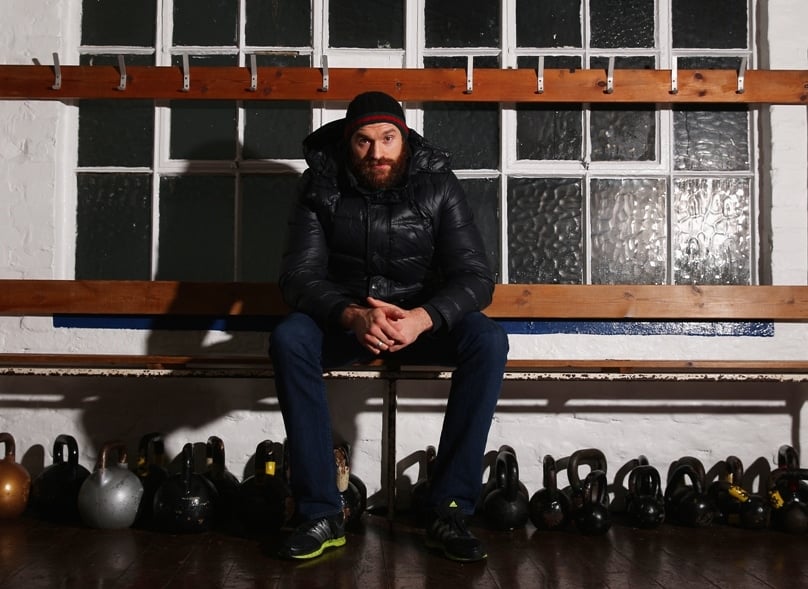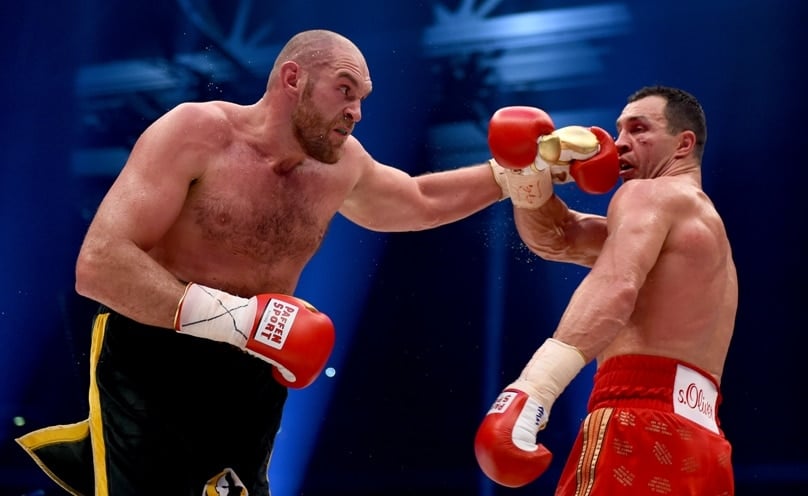
Tyson Fury doesn’t back down from a fight. While it’s a very useful trait for a boxer to have, Fury’s personal propensity for confrontation hasn’t done his public image any favours. You would be hard pushed to find someone who didn’t have an opinion about the boxer and, world champion or not, it’s increasingly rare that those views will have much to do with his sport.
Yet you have to respect someone who holds the same temperament outside the ring as he does in the heat of battle. Fury will readily spar over all manner of topics and, true to himself, isn’t afraid to speak openly about his Catholic faith, as The Catholic Weekly discovered.
To the 27-year-old Fury, born into an Irish traveller community in Manchester, England, in 1988, faith appears to be both motivational and redemptive. But, however he interprets the Bible, it’s clear to all that his faith is entirely genuine. In a career as physically and mentally punishing as his, religion can provide the essential drive to push through when the going gets tough.
“It gives me strength to know that if God is in my corner then no one can beat me,” he says.
This is just an example of the kind of affirmation which Fury can be heard offering up in press conferences and interviews. But while they do demonstrate his faith, he is just as ready to fire off controversial opinions on everything from women (girls don’t need an education) to homosexuality (should be criminalised) to the end of the world which, in an interview shortly before he won the world championship last November, he said he thought was imminent because of the world’s moral decay.
From the outside, it appears as though Tyson Fury’s opinions can come from a collision between an individual understanding of faith and the world of professional boxing.
Outwardly religious, his opinions are not – unsurprisingly – theologically sophisticated. Instead, they seem to represent a composite of ideas made up from personal interpretations of scripture informed by the kind of resurgent evangelical Catholicism that has become increasingly prominent within traveller communities in recent years.
These beliefs might not necessarily have upset some sections of the public (more than 82,000 people signed a petition to have him dropped from consideration for BBC Sportsman of the Year in 2015 after his comments on homosexuality) had they not been influenced by Tyson’s career. Professional boxing demands that fighters drum up media attention with a persona worth following, which in Fury’s case is the volatile and uncompromising ‘Gypsy King’.
And even an arch-liberal newspaper such as The Guardian, which would regard itself as antithetical to the worldview of someone like a Tyson Fury, recognises he is something more than a steretypical loud-mouthed redneck boxer.
“The truth, as ever, is less clear-cut,” wrote the paper’s senior sports writer, Barney Ronay, after Fury toppled former world heavyweight champion Wladimir Klitschko in late November last year.
“Fury is more than simply a cartoon, something other than just a tedious loudmouth. At the very least, he’s an interesting loudmouth, by all close accounts that rare specimen, the tender and personable bully, a macho braggart who also admits to being terribly fragile beneath the bluster.”
Though Fury comes from a long line of Irish travellers – his mother a Protestant and his father Catholic – it wasn’t through his parents that he began following God. Tyson wasn’t born into his faith but was instead introduced to it as a young man by his uncle, a born-again Christian and preacher within the traveller community. Since then,
Fury has spoken outwardly about his beliefs, usually with the kind of no-nonsense zeal normally associated with a street preacher.
He recently told one interviewer that “going to Heaven is the most important thing a man or a woman could ever do and being right with God is the most important thing in life”.
It’s fair to say that the boxer is keen to follow the word of God.
“I try to go to church every Sunday and I read the Bible quite a lot, although not as much as I should do,” he explains.
“Religion is complicated and hard. People have practised it for thousands of years and still not understood, so it’s hard for me to understand it all after only a few years,” he said.
“I’m always trying, always looking to be a better person, although sometimes the media pushes your opinions a certain way and people can misunderstand. Yes, I’m a controversial character, but am I a good person? Of course.”
Indeed, it remains with the best of intentions that Fury provides a voice to his increasingly-marginalised traveller heritage and his success as a boxer has given him a platform to do so. His simplistic and occasionally offensive comments about women, for example, although not representative of opinions held by the majority of his own community, are a consequence of a hyper-masculinised way of life where disputes have been settled with bare-knuckle fights for generations.
Raised in a community in which religion and fighting are both commonplace, Fury sees no problem with a life that combines the two. The question is, can the values taught by religion really exist alongside a sport that is manifestly based on violence?
There have long been associations between religious faith and boxing. Perhaps the most famous is that of Cassius Clay’s conversion to Islam and his adoptive name
Mohammed Ali. More recently, world champion Manny Pacquiao has come out as a born-again Christian. When asked, Pacquiao’s trainer summed up boxing’s relationship with faith by saying: “It’s a tough life, boxing. Fighters are often looking for something they can hold on to.”
Whether or not they adhere to any particular line of faith, almost all boxers will agree there’s a kind of spirituality in the sport. We can be deceived into thinking that boxing is simply barbaric violence but actually there’s much more to it than that.

Boxing asks its participants for a level of commitment and discipline that is unmatched elsewhere other, perhaps, than in religion. To step into the ring with another person requires one to triumph over fear. In order to overcome an opponent, boxers have to first overcome themselves. Where Fury’s career as a boxer might contradict his religion in some areas, it echoes it in others.
“God gives us talents and I’m using mine to the best of my ability,” he says, defending his sport. He sees no reason why his career should be understood as contradictory to his faith and explains, “I’ll fight any man born from his mother but it is not about that – this is a business and a job.”
He adds, “I pray for my opponents before fights, praying that they are strong and healthy and put up a good fight, but I’m doing a job like everyone else. It tells us in the Bible we need to work, and boxing is just a sport at the end of the day.”
As the heavyweight champion of the world, Fury obviously does his job exceptionally well. While he’s not short of sceptics in the outside world, there are few who can doubt his talents in the ring. He wants us to believe that a large part of the person we see in the media is a construct of the sport.
Fury famously said to his opponent Derek Chisora in the run-up to their fight: “I’ve a wife and two kids to provide for and if it means killing you in the ring, that’s what I will have to do.”
This, he firmly defends, as being a part of the theatrics designed to sell tickets. It’s true: that’s the kind of game that boxing is. And whereas many might not have known the boxer’s name before the end of last year, most do now. Through controversy, Fury has succeeded in putting himself firmly in the media spotlight.
As he told the BBC: “Doing controversial things in life is what you’ll be remembered for, not for how kind or how nice you were. People want to listen to what I say, whether it’s rubbish or facts. And not everyone is as gifted as me in being able to talk rubbish. Anybody can be Mr Boring and sit in the corner and be nice and quiet.”
Fury knows how to get attention, he uses the media for his own trail campaign much like the big budget trailers do in the run-up to fights.
Promoters want their boxers to have a personality because that’s what sells seats. Fury is uncompromising and opinionated, the kind of personality that bodes well in the sport of confrontation, and one for which his namesake Mike Tyson became increasingly known throughout his career. Fury could be using his religion as a way of generating buzz but, then again, it isn’t as if he needs to.
